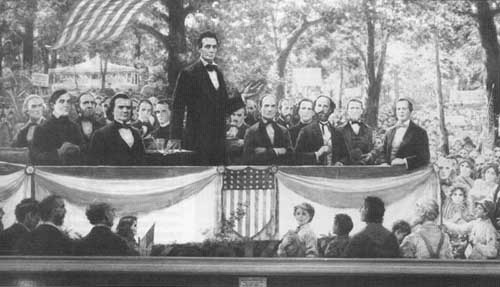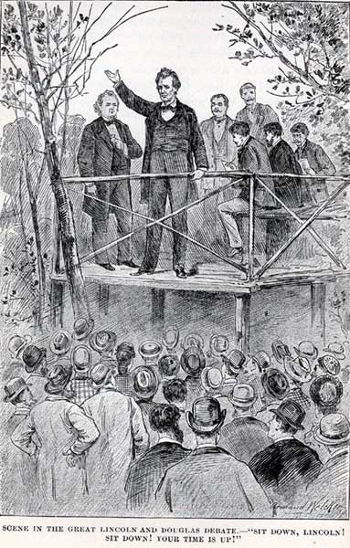
The Lincoln-Douglas Debates in Contemporary Politics
One of the seminal moments in American debate history are the 1858 debates between Abraham Lincoln and Stephen A. Douglas for the Illinois Senate. The two politicians engaged in a series of seven debates across the state of Illinois. These debates focused on the issues of slavery in new territories and popular sovereignty. Many contemporary politicians, journalists, and citizens believe that these debates were the epitome of what politics should be today, intellectual battles over the issues between the candidates.
Re-enactment of Freemont Debate
Modern Perceptions
The length and depth of each candidate’s arguments stands in stark contrast to the very limited and shallow answers that candidates give in debates today. Each candidate was given an hour and a half to speak about the issues, much different than the couple of minutes that candidates are given to answer a question now. This style of debating has been glorified by many and is claimed to have been the peak of American politics. Bob Dole, a former Senator, called debates in this style “freewheeling, open discussions of the issues.”

Many politicians, such as Newt Gingrich, are in favor of reverting back to the debate style used by Lincoln and Douglas. Gingrich and the nonpartisan group he is a part of, American Solutions, insist that this style of debate would better inform the general public and allow the issues to actually be discussed in depth. Gingrich criticizes the current style of debates by describing them as “cattle calls of ten people offering 30-escond solutions to [issues]” that make “an absurdity of running for office.” In February of 2007, Gingrich actually met with former New York Mayor Mario Cuomo at the Copper Union to have a “thoughtful and civilized conversation about the future of America.” This meeting was modeled on the Lincoln-Douglas debates, with each speaker being given thirty minutes to speak followed by thirty minutes of questions from a moderator.
Interest in imitating the Lincoln-Douglas debates is not a new phenomenon. In the late 1970s, former Senator Bob Dole of Kansas supported returning to this style of debating. He especially urged the Republican Party and presidential candidates to implement this style of debating. Dole favored “open discussions of the issues” and did not care for the state of debating during his time. He denounced modern debates, calling them, “[a] sheer popularity contest rather than a serious discussion of the challenges that face the nation.” Preceding the nomination of the Republican Party’s presidential candidate for the 2008 election, Newt Gingrich promised that he would participate in nine, ninety-minute debates in the nine weeks prior to the general election if he won his party’s nomination.
What is Forgotten
For many people, it seems as if only the positive aspects of the Lincoln-Douglas debates are remembered. For example, people often recall the sheer length of the debates as an attribute that modern debates should imitate. Modern viewers are dissatisfied with the extremely short answers that candidates give today and view the Lincoln-Douglas style of debates as a good alternative. The Lincoln-Douglas debates are remembered as being highly detailed intellectual arguments.
Although the Lincoln-Douglas debates are often glorified as the peak of American politics and debates, many flaws are overlooked. For example, the supporters of this style of debating do not take into account the attention span of modern Americans. While nineteenth-century Americans were generally accustomed to lengthy speeches by politicians, modern Americans would be unable to keep their attention focused on this style of debating. In addition to the length of the speeches, the language used is often overlooked. The type of language that Lincoln and Douglas used was very dry and contained a legal tone to it, making it difficult to understand. Perhaps the style of debating that Lincoln and Douglas were accustomed to is no longer possible to achieve in America.